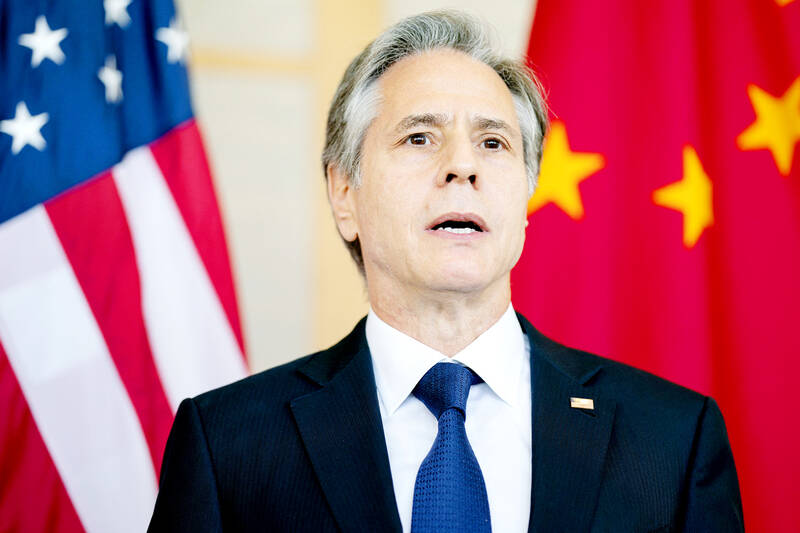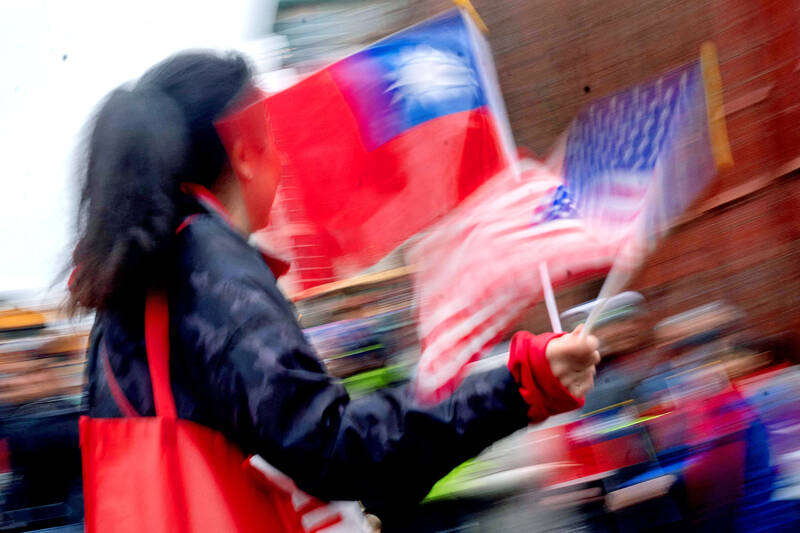The US keeps saying it wants to set a “floor” under the relationship with China. Its recent moves against Beijing and new pressure from Congress make achieving that look increasingly unlikely.
Two months after President Joe Biden met Xi Jinping (習近平) in Bali with a promise to arrest a slide in ties, the world’s two biggest economies and preeminent superpowers have been unable — or unwilling — to halt a cycle of suspicion and provocation. That’s renewing doubts ahead of talks next week in Beijing about the possibility that the relationship will ever return to normalcy.
The US is pressing ahead with a campaign to limit China’s access to sensitive semiconductor technology, by both limiting exports US companies can send to China and marshaling Japan and the Netherlands to restrict the sale of advanced chip-making equipment. China has largely held off punching back, but has shown a willingness to violate Western sanctions against the purchase of Iranian oil and, according to US officials, deepening its economic ties with Russia despite the invasion of Ukraine.

Photo: AFP
“Neither capital has indicated that they are prepared to compromise,” said Drew Thompson, a former US Defense Department official responsible for China and currently a senior fellow at the Lee Kuan Yew School of Public Policy in Singapore.
All of this makes for a tense environment for Secretary of State Antony Blinken’s visit to China next week, the first high-level US encounter there since the start of the coronavirus pandemic. It’s another step in China’s reopening since it shed its zero-COVID strategy, and it may help pave the way for another Biden-Xi meeting at the Asia-Pacific Economic Cooperation summit in the US later this year.
“This is the most consequential bilateral relationship in the world,” US National Security Council spokesman John Kirby said this week. He said the two sides would look for modest gains — such as expanded contacts over climate change and between their militaries.

Photo: AFP
Josef Gregory Mahoney, a politics professor at Shanghai’s East China Normal University, had a different take: “Perhaps it’s more like a court-mandated meeting with an ex-spouse.”
POMPEO SNUBBED
The last time a secretary of state visited Beijing was in October 2018, when former president Donald Trump’s top diplomat, Michael Pompeo, had a testy exchange with then-foreign minister Wang Yi (王毅). Wang accused the US of having “damaged our mutual trust” and Pompeo was snubbed by Xi, who broke with precedent and declined to meet with him. By contrast, Blinken is expected to be greeted by Xi.
US officials have played down expectations for Blinken’s Beijing visit, emphasizing that it’s mostly symbolic. They’ve described it as solely an effort to show the Biden administration is committed to keeping channels of communication open.
The US hopes to see deeper cooperation with China on controlling the global shipment of precursor chemicals used in fentanyl, which has fueled the US synthetic opioid crisis, a senior State Department official said on Thursday. Engagement with Beijing on the issue dropped off almost entirely as relations between the countries worsened in recent years, this person said, declining to be named to speak candidly.
The US and China also may agree to allow visa holders to stay longer and add to the number of flights between the countries, veteran US diplomat and trade negotiator Wendy Cutler said on Monday.
“This is a journey,” said Cutler, a vice president at the Asia Society. “We should not expect any breakthroughs.”
The Biden administration has privately confronted the Chinese government over evidence that the US says shows some of the country’s state-owned enterprises have been aiding Russia’s war efforts in Ukraine. Blinken will push his Chinese counterparts on the matter and make clear that the US is watching, officials said.
MARKET TURNAROUND
The meeting may be more important for China than it is for the US. China — looking to spur flagging economic growth and emerge from the COVID-19 pandemic for good — has a strong interest in making it at least look like relations are getting back on track. Xi’s abrupt shift toward a more growth-first strategy since securing a third term as Communist Party leader has helped propel a dramatic turnaround in markets.
The MSCI China Index, which had slumped to an 11-year low in October, has gained more than 50 percent in subsequent weeks, becoming one of the world’s best-performing gauges.
Beijing is urging common ground for the sake of the global economic recovery, the Communist Party’s flagship newspaper said. The US hasn’t “let go of its obsession with treating China as a so-called strategic competitor,” the People’s Daily said in a commentary Wednesday, adding that “blind anti-China approaches will not work.”
Blinken simply setting foot in China may be enough to calm rising tensions, said Wang Huiyao (王輝耀), the founder of the Center for China and Globalization, a policy research group in Beijing.
In past interactions, US and Chinese diplomats talked past each other, Wang said.
“This is very important — the image, the hand-shaking, the meeting taking place in China,” he added.
The muted expectations highlight the challenges of Biden’s “three C’s” strategy to compete, contest and cooperate. While the US wants to pressure China over national security issues, it’s far from certain that it can do so and also get China’s help on pressing global issues such as climate change.
Any tangible improvement will be hampered by the widely shared view in Washington — now incorporated in Pentagon doctrine — that Beijing poses the main threat to the US. A four-star Air Force General, Mike Minihan, fanned the tensions with a note to his staff last month, predicting war with China.
“I hope I am wrong,” Minihan wrote to his staff. “My gut tells me we will fight in 2025.”
US House Speaker Kevin McCarthy has promised to visit Taiwan, in a replay of a visit last year by his predecessor as speaker, Nancy Pelosi. Her trip sent relations into a spiral, sparking retaliatory Chinese military exercises and leading Beijing to cancel a range of working-level discussions.
One of the first acts after Republicans won control of the House was to create a committee whose sole role will be to address what’s described as the rising threat posed by China. It will be chaired by Representative Mike Gallagher, who’s among lawmakers who want to ban the China-owned TikTok social media app from US phones. He’s also interested in the type of symbolic moves that infuriate China, and may even arrange a committee hearing in Taiwan.
Even if Blinken’s visit calms the rhetoric between Washington and Beijing, neither side is expected to change positions on any of the fundamental disagreements fueling US-China tensions — and Beijing may play nice simply to focus on challenges at home.
“To the extent that there’s sort of the appearance of a lowering of tensions, I think it is tactical and near-term and is mostly a reflection of the fact that the Chinese have a ton of their own problems to deal with,” said Ryan Hass, a former US diplomat who was a White House adviser on Asia during the Obama administration and is now a senior fellow at the Brookings Institution.

In Taiwan there are two economies: the shiny high tech export economy epitomized by Taiwan Semiconductor Manufacturing Co (TSMC, 台積電) and its outsized effect on global supply chains, and the domestic economy, driven by construction and powered by flows of gravel, sand and government contracts. The latter supports the former: we can have an economy without TSMC, but we can’t have one without construction. The labor shortage has heavily impacted public construction in Taiwan. For example, the first phase of the MRT Wanda Line in Taipei, originally slated for next year, has been pushed back to 2027. The government

July 22 to July 28 The Love River’s (愛河) four-decade run as the host of Kaohsiung’s annual dragon boat races came to an abrupt end in 1971 — the once pristine waterway had become too polluted. The 1970 event was infamous for the putrid stench permeating the air, exacerbated by contestants splashing water and sludge onto the shore and even the onlookers. The relocation of the festivities officially marked the “death” of the river, whose condition had rapidly deteriorated during the previous decade. The myriad factories upstream were only partly to blame; as Kaohsiung’s population boomed in the 1960s, all household

Allegations of corruption against three heavyweight politicians from the three major parties are big in the news now. On Wednesday, prosecutors indicted Hsinchu County Commissioner Yang Wen-ke (楊文科) of the Chinese Nationalist Party (KMT), a judgment is expected this week in the case involving Hsinchu Mayor Ann Kao (高虹安) of the Taiwan People’s Party (TPP) and former deputy premier and Taoyuan Mayor Cheng Wen-tsan (鄭文燦) of the Democratic Progressive Party (DPP) is being held incommunicado in prison. Unlike the other two cases, Cheng’s case has generated considerable speculation, rumors, suspicions and conspiracy theories from both the pan-blue and pan-green camps.

Stepping inside Waley Art (水谷藝術) in Taipei’s historic Wanhua District (萬華區) one leaves the motorcycle growl and air-conditioner purr of the street and enters a very different sonic realm. Speakers hiss, machines whir and objects chime from all five floors of the shophouse-turned- contemporary art gallery (including the basement). “It’s a bit of a metaphor, the stacking of gallery floors is like the layering of sounds,” observes Australian conceptual artist Samuel Beilby, whose audio installation HZ & Machinic Paragenesis occupies the ground floor of the gallery space. He’s not wrong. Put ‘em in a Box (我們把它都裝在一個盒子裡), which runs until Aug. 18, invites